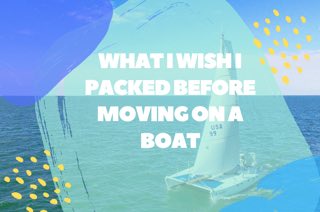Where can you anchor in Florida? I have to admit before doing my research for this article I had no idea what the exact laws for anchoring in Florida were. Pretty sad taking into consideration we have been living aboard, primarily at anchor, for over three years. My thought was, as long as you were out of the way, displayed proper registration and lights, and kept the boat neat and tidy there should not be a problem. I guess if everyone thought like that then there would not be a problem.

Derelict boat in Stuart, Florida
Florida has always had a derelict boat problem but the recession in 2008 and our frequent hurricanes caused the numbers to skyrocket. Previously beautiful and quant anchorage are turning into boat junk yards. Some owners are never seen and some of the boats are either dragging or half sinking.

Abandoned boat in Jupiter Florida
This can not only harm other boaters with a possible collision but think about the fuel and oil that is released into the water when one of these boats sink.

Fuel Spill in Stuart Florida
So the question is what are the rules and who is suppose to be in charge of keeping everything in check? From doing my research I can tell you that the answer is hard to find and not clear unless you can decipher legal terms. Boat U.S. and FWC did have some great easy to read info though!
What I have learned is as follows: In 2009 many changes were made to Florida law chapter 327 (which includes laws dealing with vessel safety… in case you were wondering… who would know that?!). These changes increased boaters ability to anchor within the state by forbidding cities and counties to enforce any local regulation on anchoring vessels outside marked mooring fields. However, local governmental authorities are free to enact and enforce regulations regarding floating structures and liveaboard vessels (a vessel is considered a “liveaboard vessel” if: it is used solely as a residence and not for navigation). Which means as long as you go out for a cruise every once and a while and your boat is in operable condition you should have the right to anchor freely outside marked mooring fields and channels.
However, there are a few exceptions with the temporary pilot mooring and anchoring program that was also put in place in 2009. This program means that five localities around Florida were given the right to regulate anchoring within there area. The goals of the pilot program were to enhance navigational safety, protect maritime infrastructure, protect the marine environment, deter derelict vessels, and to promote the establishment and use of public mooring fields. The five areas selected include the City of St. Augustine, the Florida Keys, City of Sarasota, City of St. Petersburg, and the City of Stuart. Each of these different areas set up their own approach to regulating anchoring. For example, The City of Stuart claimed to be enforcing new regulations including but not limited to: no anchoring within 150 feet of marine infrastructure, any vessel anchored for more than 10 consecutive days must show proof of operability, any vessel anchored for more than 10 days and equipped with a type III marine sanitation device must provide proof of pump out within the previous 10 days.
As great as it sounds I have to admit we lived aboard at anchor in the pilot program area of Stuart for most of 2015 and never saw anyone checking operability or pump out receipts.
The timeline for this temporary pilot program was to be from 2009 to July 1, 2014. The deadline was extended to July 1, 2017. After July 1, 2017 the local ordinances expired and are now unenforceable.
It took me a few days to find out what happens now that the pilot program had expired. I called and emailed multiple people and was finally put in touch with Robert Rowe, FWC’s boating and waterways section leader who was extremely helpful and answered all my questions.
Information was gathered from all the pilot programs and new Florida anchoring and mooring laws were made.
I have compiled an easy to read article of the updated Florida anchoring laws which can be found here.
Florida law makers seem to be moving in the right direction to keep our waterways clean and clear while still giving the active cruiser the ability to anchor in most places.
Thanks for reading!
Sierra:)





Thanks for researching and posting. We’re our worst enemies when it comes to anchoring and taking advantage of peoples privacy and conservation of our waterways. Boats US has made great progress keeping our freedom to anchor in Florida’s beautiful waters alive.
I have a few questions for Robert Rowe about mooring my boat in Sarasota…can you please provide me with his contact info? Thanks!
Thank you also for publishing that article because we’re having problems in Jupiter near The mooring site of the Burt Reynolds boat ramp. Can you give me any info or law that Jupiter has changed for the city council any of the 327 Florida statute or any of this areas right to anchor law where I’m talking about at the Burt Reynolds boat ramp area as long as we are 150 ft from the dock is it permissible to anchor here for 30 days, as long as the boat is operational and registered,is there any new city law here in Jupiter Florida
Truly when someone doesn’t be aware of after that its
up to other viewers that they will assist, so here it occurs.
Just starting out and I’m from Stuart and wanted to stay close to home for the for most times ‼️💯
I’m looking to move aboard my sailboat full time. I’m also from Jupiter, FL and would like to live nearby full time on my sailboat, as my life is here in Jupiter.
This article, as well as the one linked in this article (https://tulasendlesssummer.com/florida-anchoring-laws/), make it seem like it would be legal for me to live aboard my sailboat and simply move between different anchoring points within Jupiter (and/or perhaps move up to Stuart or down to North Palm Beach every few months) indefinitely. This way I could still live in the Jupiter area, but avoid the (very expensive) cost of renting a slip.
Of course this would pose new challenges, like producing all my electricity, and stopping at marinas every so often to pump out and refill water, but those are for a separate conversation.
Am I missing something? Is this really something I can do legally? Does anyone know of someone doing something similar in Palm Beach County?